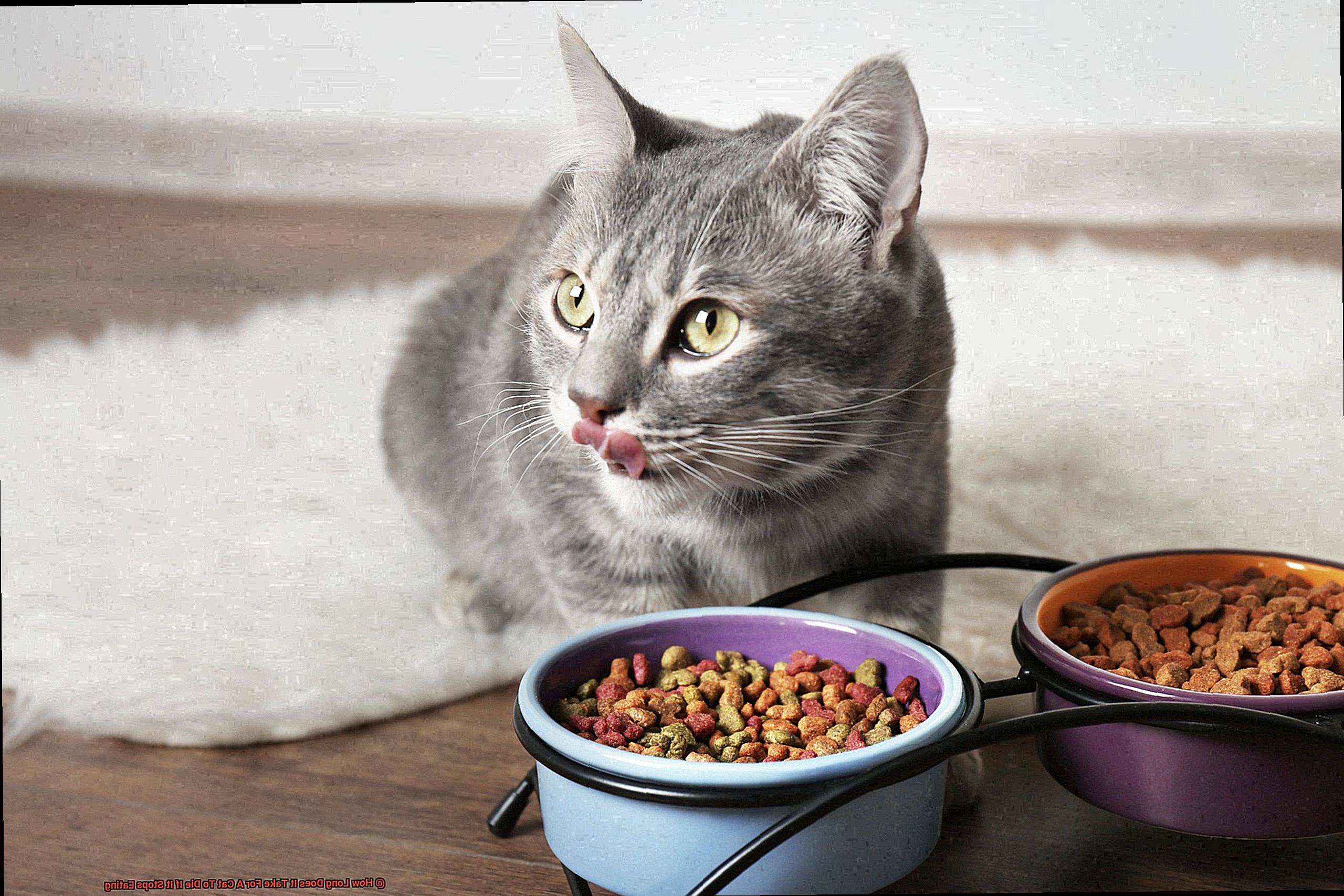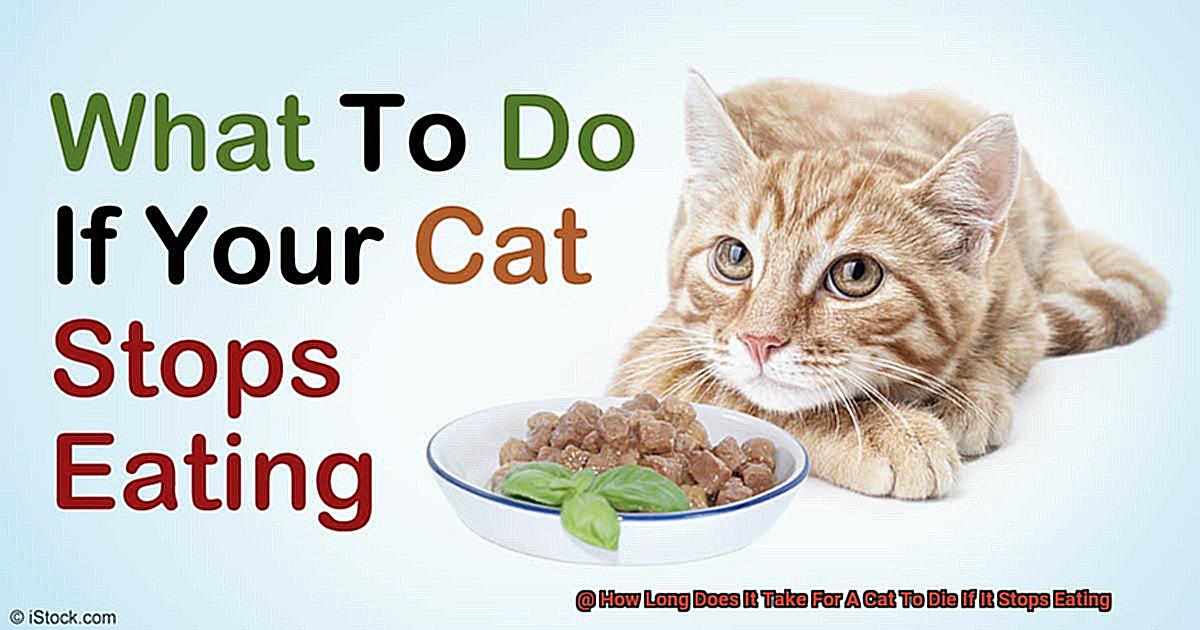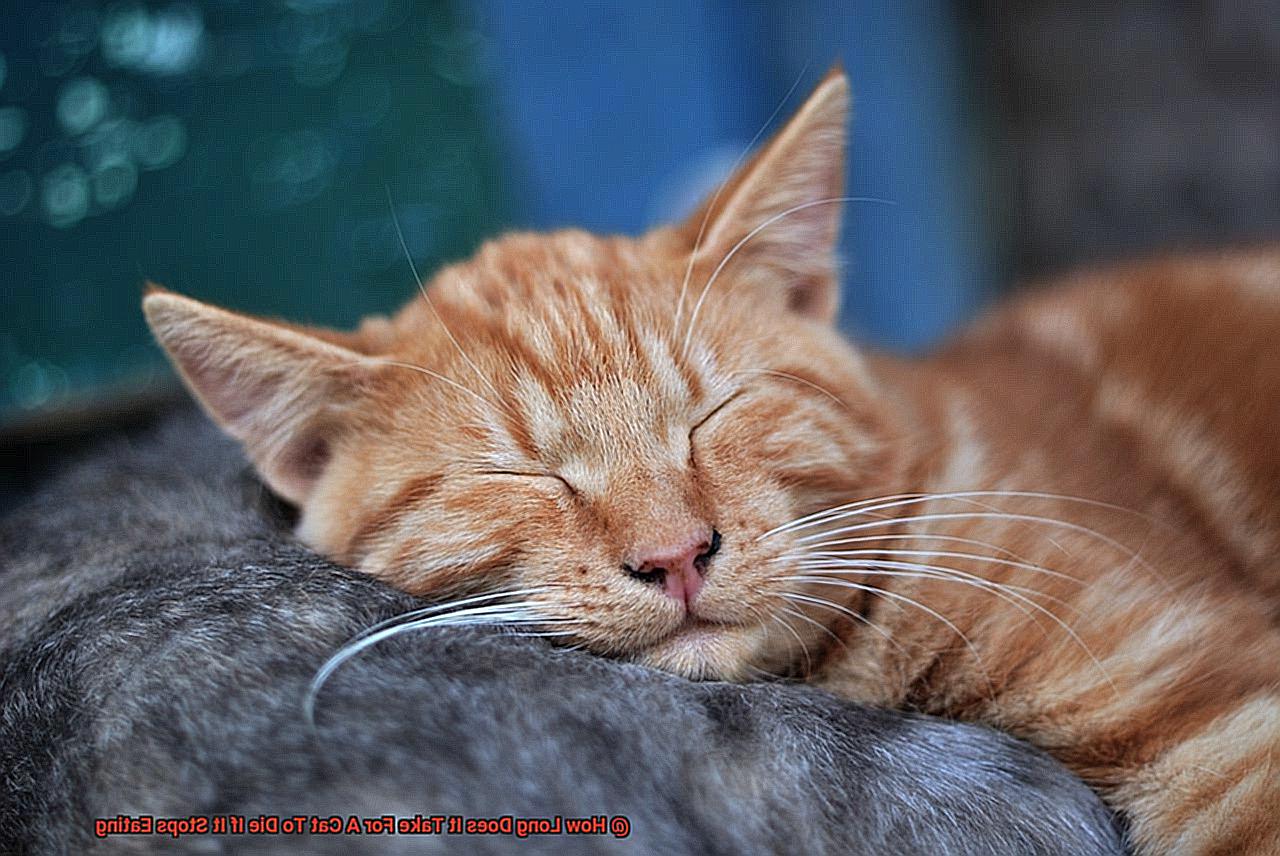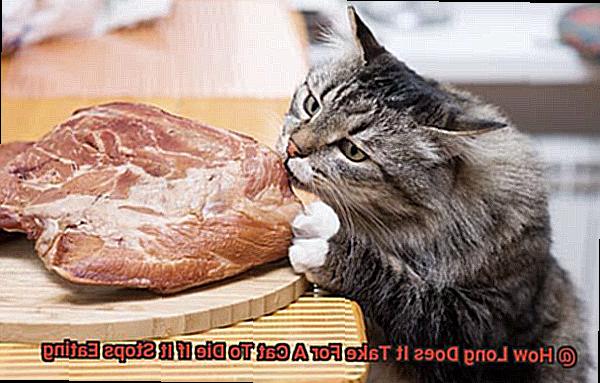Have you ever wondered how long a cat will live if it stops eating? The answer may surprise you. Although cats can survive for several days without food, the length of time before they succumb to death is much shorter than one would expect.
This blog post will explore the effects of starvation on cats and answer the question: how long does it take for a cat to die if it stops eating? We’ll also examine what causes influence this timeline, as well as what steps owners can take to prevent their cats from reaching this date. Plus, we’ll discuss the warning signs that a cat is in danger of starving and provide tips on how to support an undernourished pet.
The truth is that cats can become dangerously ill within three days of not eating. During this time, their bodies start to use up muscle and fat reserves for energy, leading to extreme fatigue and lethargy. Dehydration can set in quickly too, as cats lose essential fluids due to lack of diet.
Prolonged starvation can damage organs such as the heart and liver, resulting in organ failure and ultimately death. This process can take anywhere from 1-4 weeks depending on the severity of hunger and other conditions such as age or underlying health issues.
Since cats rely on us for all aspects of their care, it’s vital that we do our best to keep them healthy and well-fed at all times. In the next section, we’ll look at warning signs that your cat is at risk of starvation as well as tips on how to help an underweight pet gain back lost weight safely and effectively.
Causes of Cats Stopping Eating

It could be a cause for concern as cats that stop eating can develop serious health complications, and even death. There are several reasons why cats stop eating, such as illness, stress, and dental issues.
Illness
One of the most common causes of cats not eating is illness. Cats can suffer from various medical conditions that can affect their appetite, such as kidney disease, liver disease, or cancer. These conditions can cause the cat to feel nauseous or unwell, leading them to avoid food altogether.
Stress and anxiety
Stress and anxiety can also lead to cats not eating. Changes in environment or routine, such as moving to a new home or a new pet or baby in the family may cause a cat to become stressed and refuse food. In extreme cases, some cats may even stop drinking water resulting in dehydration.
Dental Issues
Cats with dental issues may also have difficulty eating due to pain and discomfort when trying to eat hard food. This may lead them to avoid food entirely or prefer wet food instead of dry kibble.
It is essential for pet owners to keep an eye on their cat’s feeding habits and seek veterinary care if they go more than two days without eating. Fatty liver disease is a chronic condition that requires immediate medical attention in order to prevent further complications or death.
The Dangers of Not Eating for a Cat

Not eating for a cat can have devastating consequences. Cats are obligate carnivores, which means they rely on a protein-based diet to survive. When cats stop eating or drastically reduce their food intake, their bodies start breaking down muscle tissue for energy. This process, known as gluconeogenesis, can lead to muscle wasting and weakness.
Furthermore, not eating can cause serious implications for the liver. The liver is responsible for converting food into energy and filtering toxins from the bloodstream. When a cat goes without food or greatly reduces its food intake, the liver can become overwhelmed with fat and toxins, leading to liver damage and even failure.

Dehydration is another major risk when cats don’t eat. Without water, a cat’s body cannot function correctly. Dehydration can cause lethargy, weakness, and potentially life-threatening complications such as kidney failure.
Finally, not eating for an extended period may be an indication of a more serious underlying health issue like cancer, pancreatitis or kidney disease. If your cat isn’t eating for more than a day or two, it is essential to seek medical attention immediately in order to determine the underlying cause and begin appropriate treatment.
Signs Your Cat May Be Suffering from Fatty Liver Disease
If your cat has suddenly lost its appetite, it could be a sign of something more serious than simply not liking the food. Fatty liver disease in cats, also known as hepatic lipidosis, is a life-threatening illness that can occur when cats stop eating.
The accumulation of fat in the liver due to the body breaking down its fat reserves to fuel the metabolism is responsible for this condition. If left untreated, fatty liver disease can lead to death in a matter of weeks.
It’s important to recognize the signs and symptoms of fatty liver disease in cats so you can act quickly if necessary. The most common symptom is a sudden lack of appetite that results in rapid weight loss.
Other signs may include lethargy, vomiting, diarrhea, jaundice, and dehydration. If your cat is exhibiting any of these symptoms, it’s essential to seek medical attention immediately for diagnosis and treatment.
Fortunately, with prompt and appropriate care, cats with fatty liver disease have a generally favorable prognosis.
Treatment usually involves supportive services such as feeding tubes and fluid replacement as well as addressing any underlying health issues.
How to Know if Your Cat Is Not Eating Enough
Cats are known for being picky eaters, but if your feline friend has stopped eating completely, it could be a sign of something more serious. Knowing the signs of a cat not eating enough can help you recognize and treat health conditions before they become life-threatening.
One of the first things to look out for is a decrease in appetite. If your cat usually devours their food as soon as it’s put down, but then starts picking at it or ignoring it entirely, it’s a sign they may not be feeling well.
Weight loss is another indicator: if your cat’s ribs or spine are more visible than usual, they may not be eating enough.
Vomiting or diarrhea can also have an impact on a cat’s appetite and lead to dehydration, which can further complicate health issues.
Keep an eye on your cat’s litter box and note any changes in bowel movements or frequent vomiting.
Boredom or stress can also cause cats to stop eating, so make sure you provide stimulating toys and a comfortable, stress-free environment for them to enjoy.
Additionally, some medical conditions can cause cats to lose their appetite, such as kidney disease or dental problems. If you notice any concerning symptoms, it’s best to take your pet to the vet for a check-up right away.

Treatment Options for Fatty Liver Disease in Cats
If your cat has been diagnosed with fatty liver disease, it’s essential to act quickly and work closely with your veterinarian to create a customized treatment plan. Left untreated, this condition, also known as feline hepatic lipidosis, can be fatal, so it’s important to start treatment as soon as possible.

Treatment for this disease typically involves a combination of medical and dietary interventions.
First, any underlying medical conditions must be addressed and treated. This may include medications or supplements to control nausea and vomiting, as well as supportive care such as hydration and nutrient supplementation. In some cases, hospitalization may be necessary for intensive care.
In addition to medical treatments, dietary modifications are essential for treating fatty liver disease in cats.
Cats with this disorder require a high-protein, high-calorie diet in order to provide the necessary nutrients and energy to support their livers and prevent further fat accumulation. In some cases, a feeding tube may be needed to guarantee adequate nutrient intake.
When it comes to treating fatty liver disease in cats, early intervention is key. Many cats are able to recover from this condition with proper care and return to their normal activity levels.
However, cats with advanced or severe cases may need more intensive and long-term management.
How to Help Your Cat Start Eating Again
It’s heartbreaking to see your beloved cat refusing to eat, but with patience and perseverance, you can help your furry friend start eating again. Here are five steps that you can take to get your cat back on track.
Identify the Cause
The first step in aiding your cat’s appetite is to determine the cause of their loss of appetite. This could be due to illness, dental problems, stress or anxiety, or even a change in their environment. Once you’ve identified the underlying cause, you’ll be able to take action to address it.
Offer Variety
Cats are notorious for being picky eaters, so try giving them a variety of food choices. Offer wet food, different brands of dry food, and even some fresh cooked meat or fish. This will make mealtime more appealing and encourage their appetite.
Create a Cozy Environment
Stress can also play a role in your cat’s lack of appetite, so try reducing their anxiety by creating a calm and comfortable environment for them to eat in. Providing them with a familiar feeding area can also reduce stress levels and make them more likely to eat.
Monitor Water Intake
Dehydration can worsen your cat’s lack of appetite and cause further health problems, so it’s important to keep an eye on their water intake as well. You can try adding water to their food, offering them wet food, or providing them with a separate source of water like a pet fountain or bowl with moving water.
Seek Veterinary Assistance
If your cat is still refusing to eat after trying all of these methods, it may be necessary to seek veterinary assistance for medical intervention such as appetite stimulants or nutritional support. Your veterinarian will have more information on how best to help your cat regain their appetite and maintain good health overall.
Tips for Keeping Your Cat Healthy and Happy
Cats are one of the most beloved pets in the world, and as a responsible pet owner, it’s essential to ensure your feline friend is healthy and happy. Here are five tips for keeping your cat healthy and happy:
Feed Them Right
Provide your cat with a balanced and nutritious diet that contains all the necessary nutrients they need to thrive. Opt for high-quality cat food that is specifically formulated for cats, and avoid feeding them table scraps or human food.
Exercise Regularly
Exercise is just as important for cats as it is for humans. Engage your cat in regular playtime sessions or provide them with toys to keep them active and interested. This can help prevent obesity in cats which can lead to various health issues.
Visit the Vet Regularly
Make sure you take your cat for regular check-ups, vaccinations, and screenings at the vet to detect any potential health problems early on and treat them accordingly.
Provide a Clean and Safe Environment
Keep your cat’s living environment clean and safe by providing them with a clean litter box, a comfortable place to sleep, and regular grooming sessions to keep their coat healthy and free of matting. A stress-free environment is also essential for their overall wellbeing, so try to minimize any stressful situations or changes in their routine.
Show Them Love and Attention
Cats love attention and affection. Spend time with your cat every day – play with it, cuddle it, show it love – will strengthen the bond between you and your kitty while keeping your household happy and content.
Conclusion
It’s our responsibility to take care of our cats. As obligate carnivores, they rely on us for their diet and nutrition, and can become dangerously ill if they stop eating or drinking.
Here, we explored the effects of starvation on cats, causes of not eating, dangers of not eating, warnings that your cat is not eating enough, treatment options for fatty liver disease in cats, and how to encourage your cat to eat again.
It’s critical to know the signs of a cat not eating so you can respond quickly if necessary. Fatty liver disease is a life-threatening illness that can cause vomiting and needs urgent medical attention for diagnosis and treatment.
If your cat isn’t feeling well or has stopped eating completely, take them to the vet right away for an evaluation.
Providing your cat with a balanced diet, plenty of fresh water and exercise, regular vet visits, and lots of love and care are all essential in keeping them healthy and happy.







